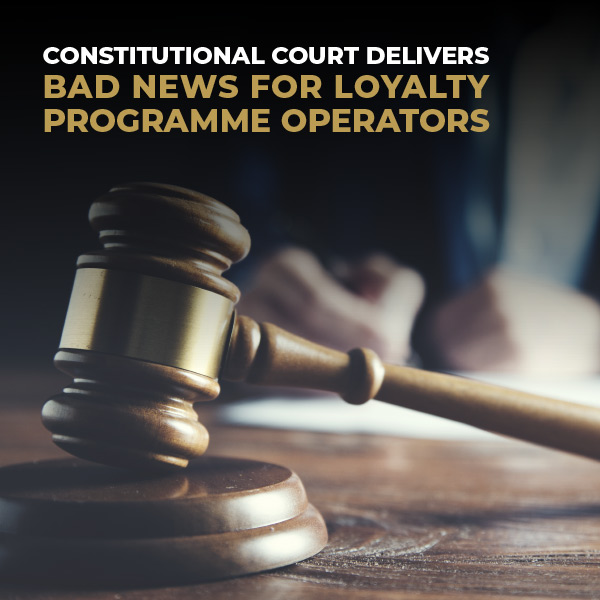CONSTITUTIONAL COURT DELIVERS BAD NEWS FOR LOYALTY PROGRAMME OPERATORS
On 21 May 2021, the Constitutional Court handed victory to SARS in a decision that may have sweeping ramifications for retailers who operate loyalty plans similar to the Clicks ClubCard loyalty programme.
What was at stake for Clicks and other retailers?
The matter of Clicks Retailers (Pty) Limited v Commissioner for the South African Revenue Service [2021] ZACC 11 involved the application of section 24C of the Income Tax Act No. 58 of 1962 to its loyalty programme.
Section 24C allows taxpayers to defer paying tax on income if it accrues in terms of a contract and that income will also be used to finance future expenditure. The taxpayer may then, in terms of section 24C, claim a deduction in respect of such future expenditure, provided the income and the obligation to incur the future expenditure arise from the same contract.
In this case, Clicks sought to utilise this provision on the basis that its ClubCard loyalty programme creates an obligation to incur future expenditure when card holders earn loyalty points by making purchases at Clicks stores. The loyalty points awarded translate to a cost that Clicks will incur on merchandise provided to customers upon redemption of cash back vouchers. In other words, when Clicks makes a sale for which it receives income, an obligation is created at the same time to incur a cost at a future date.
Clicks returns 2% of the value of all qualifying purchases to customers and its inability to deduct this cost will have a significant impact on its cash flow. The import of the judgment, however, extends well beyond the interests of Clicks. The court acknowledged that other retailers such as Pick ‘n Pay, Dischem, Ster Kinekor and Exclusive Books, to name a few, will also be impacted by the court’s decision.
The dispute
SARS maintained that Clicks is not eligible for the section 24C deduction, as the income it receives and the obligation to incur the future expenditure arise from separate contracts.
Clicks succeeded in the Tax Court, which concluded that the income earning contract and that which gives rise to the obligation (the ClubCard contract), are inextricably linked. SARS appealed to the Supreme Court of Appeal (“SCA”). It is important to note that Clicks’ appeal was heard shortly after the SCA handed down judgment in Commissioner, South African Revenue Service v Big G Restaurants (Pty) Ltd [2018] ZASCA 179; 2019 (3) SA 90 (SCA) (“Big G”), which dealt with the same issue.
In Big G, the SCA rejected the notion that section 24C applies where the contracts are “inextricably linked” – the income and the obligation must emanate from the same contract. The SCA therefore set aside the Tax Court’s decision. But Big G took the matter to the Constitutional Court, where the interpretation of section 24C was widened, albeit slightly. The Constitutional Court confirmed section 24C may apply where there is more than one contract, provided they are so inextricably linked that they satisfy the requirement of “sameness”.
Big G lost the appeal, but it gave Clicks another bite at the cherry. Clicks filed its appeal to the Constitutional Court, which accepted that there is a significant factual overlap and an inextricable link between the ClubCard contract that imposes the obligation to incur a future expenditure and the contract of sale. However, it is not sufficient for the two contracts to be inextricably linked; the link must be of such a nature that they give rise to a “sameness”.
In the present matter, the Constitutional Court found that the link between the two contracts do not render either dependent on the other for its existence; they operate together but they do not meet the requirement of contractual sameness. The upshot is that section 24C does not apply to Click’s ClubCard loyalty programme and the retailer incorrectly claimed these deductions.
Analysis
While the matter does not involve a constitutional question, the Constitutional Court accepted, as with Big G, that Clicks should be granted leave to engage its jurisdiction on the basis that the matter involved an arguable point of law which is of general public importance. The court held that this is evidenced by the divergent approaches taken by the Tax Court and the SCA, and the importance to the general public lies in the potential impact for other operators of such loyalty programmes.
The decision to entertain the matter must be welcomed, as it allowed the court to shed some light on the application of section 24C, by giving definition to the sameness test where two or more contracts are involved.
What does the judgment mean for other retailers?
Other entities that similarly sought to claim the section 24C allowance must carefully study the judgment against the operation of their own loyalty programmes. But with a model that is hardly unique, it is difficult to see how their fate would be any different and it is possible that they might inadvertently find themselves in a position of non-compliance.
The judgment again serves as a cautionary tale where contracts are drafted without an understanding of the tax implications, which can make for a nasty surprise down the line.
![2025-logo-[Recovered] Tax Consulting South Africa](https://www.taxconsulting.co.za/wp-content/uploads/2025/01/2025-logo-Recovered.png)




